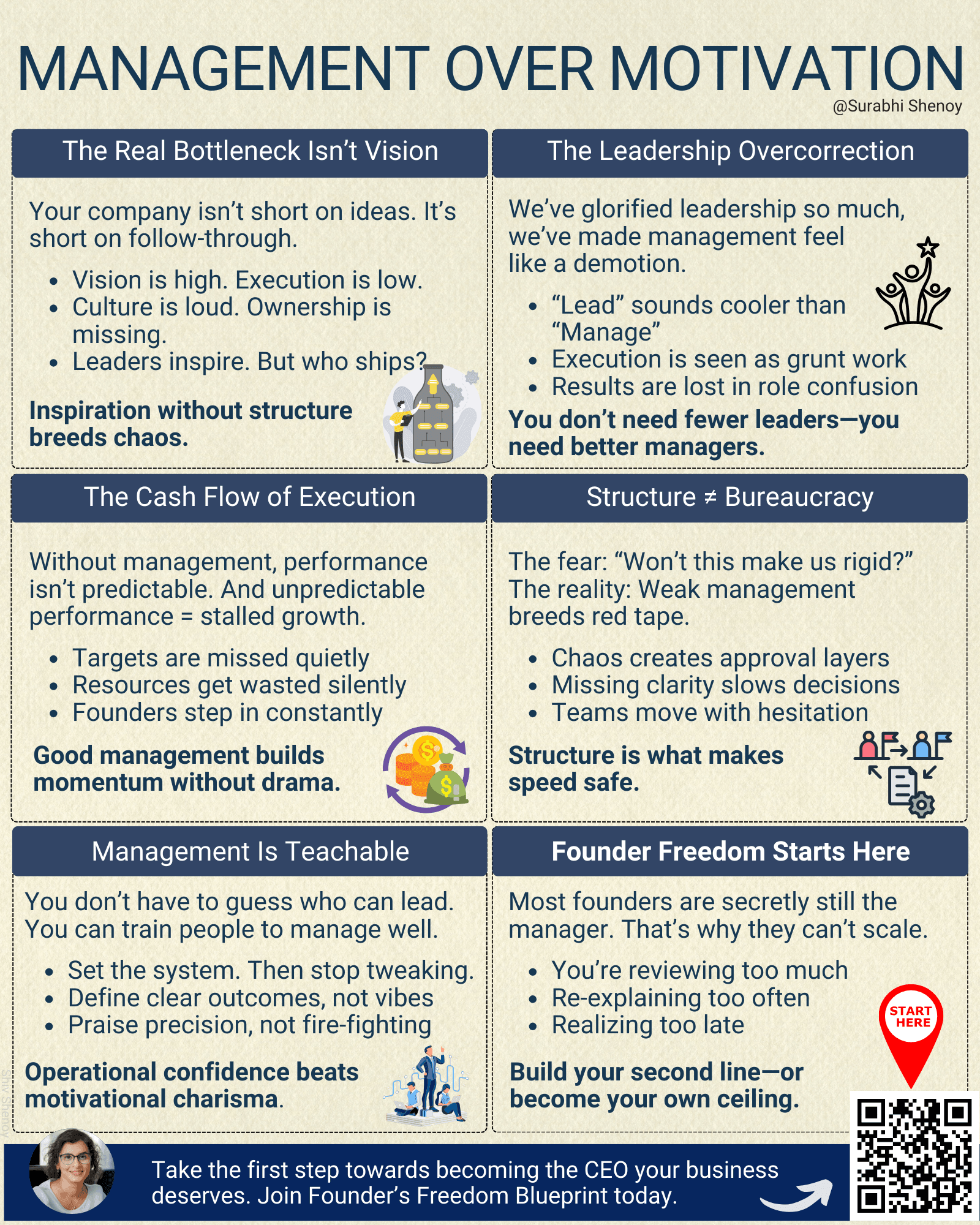This letter isn’t going to follow the popular narrative.
But after building my two companies and hundreds of conversations with founders, I need to say this –without sugar coating.
The business world has forgotten something essential about how great companies actually grow.
Today, everyone wants to be a “leader.” The word “management” has almost become a bad word to say..
But the truth is: Right now, your growing business needs good managers far more than it needs inspiring leaders.
Here’s what’s gone wrong
Yes, leadership skills matter. But the pendulum has swung too far:
- We glorify vision but undervalue execution
- We celebrate inspiration but ignore accountability
- We talk culture but forget performance
This imbalance leaves founders stuck in consensus building while business performance suffers.
Let me be clear:
I’m not against leadership.
I’m against the ABSENCE of management.
I am against dressing up management as something else –and letting the performance slip.
Management: The Muscle You’re Not Training
Here’s what actually makes your company more money:
- Using resources wisely
- Meeting targets every quarter
- Creating growth you can predict
- Clear systems that show who’s responsible for what
See a pattern? This is what good management creates.
The fastest-growing companies don’t just dream big—they execute through solid management frameworks. Every single time.
Not every day and every job requires inspiration.
Some things need to be done because they need to be done. Period.
The Right Balance for Scaling
As a founder who’s sold two companies, I’ve learned that:
- Leaders set direction. Managers get you there
- Buyers don’t pay more for inspirational stories. They pay for proven operations.
- Too much freedom = inconsistency, wasted resources, and founder burnout
If you are training people on “How to become more effective leaders,” make sure to include “How to become effective managers” as well.
The good news is – management skills are more teachable and measurable than leadership skills. That makes them your fastest path to scale, without breaking yourself.
Bringing Management Back / Execution Loop founders need
Here is the simple path founders need to bring back the management without making it rigid.
Make It, Write It, Use It, Keep It
- Make the system (yes, collaborate here – then stop)
- Write down the steps (clear, simple instructions)
- Use it one way (this is now THE way we do it)
- Keep it going (innovation happens in designated places, not everywhere all the time)
Yes, there’s a place for democracy in your business, but it’s not in day-to-day execution.
Founders and a few key people can establish an inspiring vision, but others need clear direction and accountability—that’s not oppression; it’s clarity that truly empowers people.
Stop Hiding Management as "Leadership"
Look at the job titles in your company:
- How many “Leaders” vs. “Managers”?
- Are your “Leaders” actually managing the work, time, and results?
If yes, you have unintentionally confused your teams about their priorities.
Bring Back Real Management
If you want consistency, predictability, and peace — start here:
Use the right titles.
If someone’s job is to get results through a team, they’re a manager. Don’t hide it.
Make management jobs clear.
“Make this system work. Hit these goals. Use these resources well.” Simple.
Praise management wins.
“Thanks to Sarah’s tight handling of our shipping process, we cut mistakes by 68%.”
Don’t let people freestyle the system.
If someone finds a better way? Awesome.
Write it down. Test it. Roll it out. But don’t wing it solo.
The Culture Question: "Won't This Create Bureaucracy?"
Let’s address the elephant in the room.
When I talk about bringing management back, founders often ask: ‘But won’t that create a rigid culture?’”
The exact opposite happens.
Strong management doesn’t build bureaucracy—it kills it.
Here’s what actually happens when you build proper management systems:
- Clarity replaces confusion.
- Performance gets measured objectively.
- Innovation happens in focused zones—not everywhere, all the time.
- Trust skyrockets.
- Burnout drops. Predictability increases.
- And for founders? Less chasing. More momentum.
The truth? Weak management creates the need for bureaucracy.
When management is absent, chaos follows. Then companies add layers of approvals and checkpoints to compensate.
The most engaged, creative, and high-performing teams I’ve ever seen? They operated within crystal-clear management frameworks.
They knew exactly what game they were playing—and then played it brilliantly.

The Bottom Line
The businesses suffering most today aren’t lacking vision or inspiration—they’re drowning in too much freedom without enough structure.
Your company doesn’t need more big thinkers right now—it needs people who can build systems and ensure they’re followed.
If I’m trying to grow fast—without burning out—give me a team of reliable managers over a room full of visionary storytellers. Every. Single. Time.
The Course That Builds Strong Management
If you believe that solid management is essential—not just for founder freedom, but for growth, scale, and long-term value—this is your next step.
Inside Founder’s Freedom Blueprint, Module 4 is dedicated to designing your core team that frees you. In this module, I show founders how to:
- Distinguish between “initiative-takers” and “implementers.”
- Hire for management capacity rather than just technical expertise
- Build a core team that can operate independently, enabling you to concentrate on growth.
This is the exact system I used to build and exit two companies—and the same system my private clients pay thousands to implement.
If you’re tired from being the only person who truly manages your business—this is where you build your line of management.
📚 From My Bookshelf:
Actionable insights from books that transformed me and how I built.
Book: The Psychology of Money
Building a business that generates cash is one skill. Building lasting wealth is another. In this article, I share 10 shifts you need to move from Growth Mode to Wealth Mode. If you are an entrepreneur who has achieved growth but still feels financially stressed, then this post is for you.
Thank you for being here. I will see you next Thursday,
Surabhi

